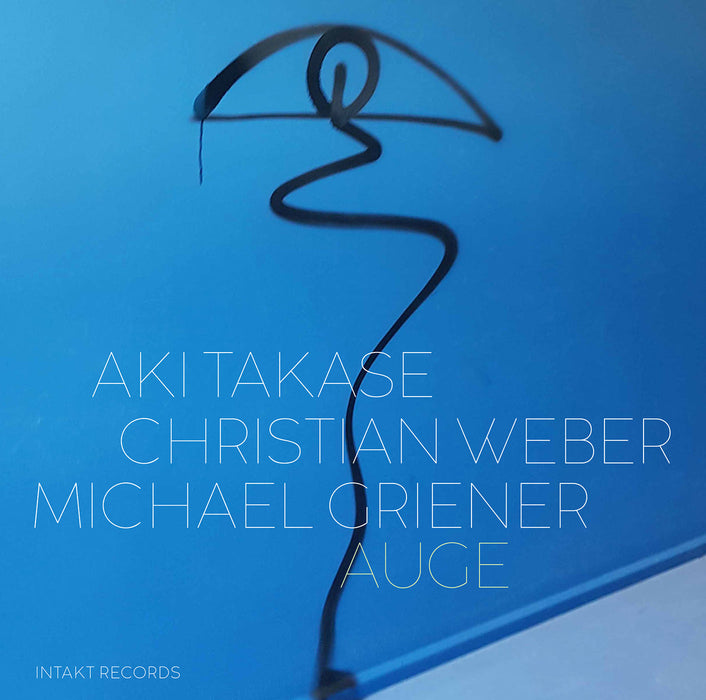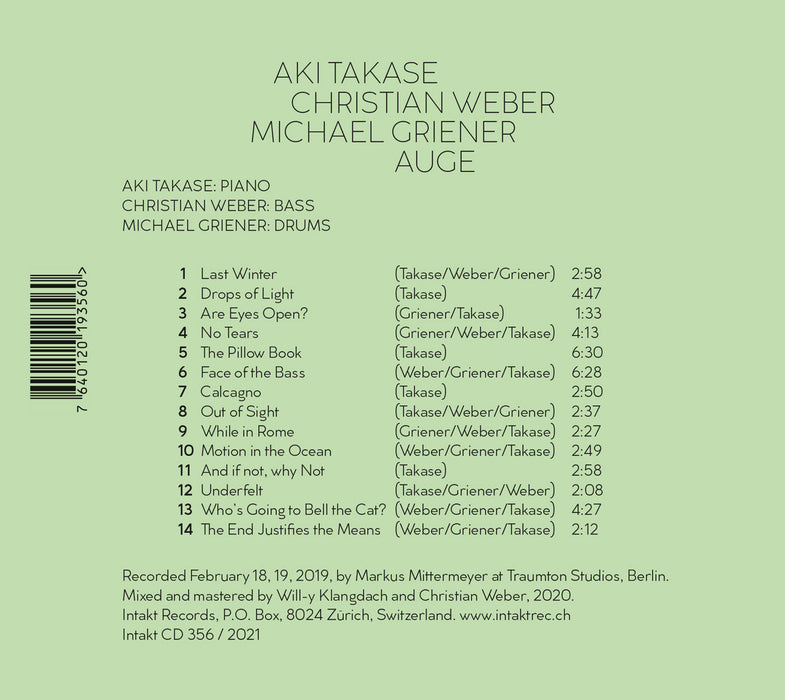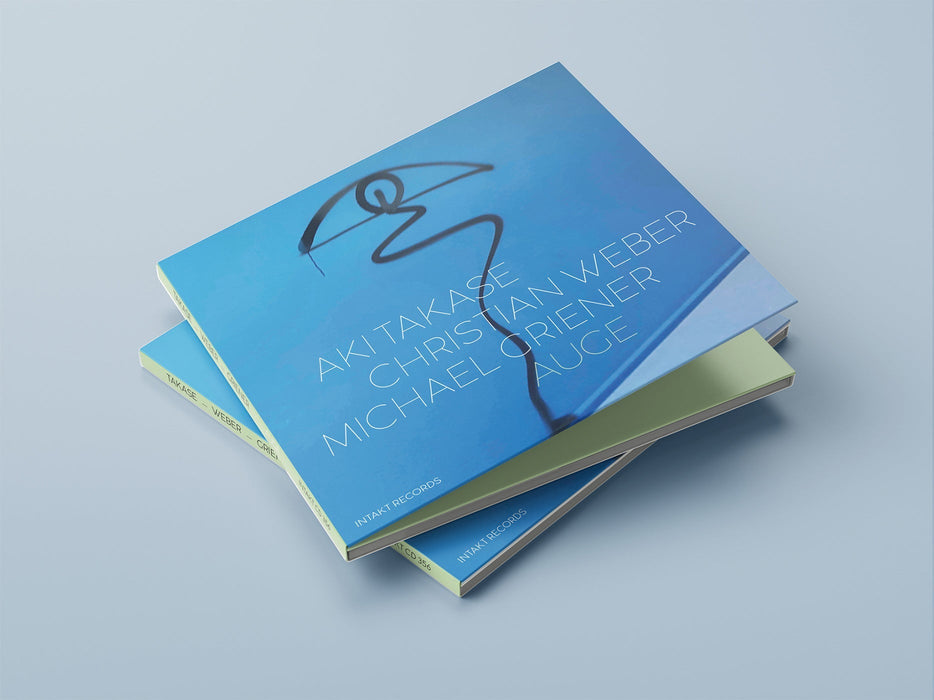


356: AKI TAKASE CHRISTIAN WEBER MICHAEL GRIENER. Auge
Intakt Recording #356/ 2021
Aki Takase: Piano
Christian Weber: Bass
Michael Griener: Drums
More Info
"Ich liebe das Klaviertrio", sagt die Pianistin Takase mit derselben Präzision, der ihr Spiel prägt. «Aber nicht die alte Idee, bei der die Pianistin die Königin ist und Bassist und Schlagzeuger nur Nebenfiguren.» Tatsächlich stehen beim Trio AUGE alle drei im Fokus: Der Bassist Christian Weber und der Schlagzeuger Michael Griener zählen zu den eigensinnigsten Virtuosen ihres Instrumentes. Auf Intakt haben Sie mit dem New Yorker Saxophonisten Ellery Eskelyn brilliante Alben vorgelegt. Christian Weber spielte Alben ein mit Olvier Lake. Michael Griener wirkt als Mitglied der Band Die Enttäschung und Monks Casino mit Alexander von Schlippenbach. Die Pianistin Aki Takase hat im Laufe von fast vier Jahrzehnten immer für frische Impulse gesorgt, sei es im Duo mit David Murray oder Louis Sclavis oder mit ihrer Solo Aufnahmen «My Ellington» oder «Hokusai». Der Chicagoer Journalist Peter Margasak schreibt zur Trio Aufnahme: «Die Musik auf dem Debütalbum des Kollektivtrios Auge ist weit offen, der Blick ungetrübt, als wäre alles möglich. Die Musiker*innen bewegen sich in absoluter Freiheit, selbst wenn sie sich von einer losen Komposition leiten lassen. Freie Improvisation klingt selten so überzeugend, selten sind Rhythmus und Harmonie so kunstfertig ausbalanciert.»
Album Credits
Cover photo: Valentin Rothmaler
Graphic design: Paul Bieri
Liner notes: Peter Margasak
Photo: Stefanie Marcus
Recorded February 18, 19, 2019, by Markus Mittermeyer at Traumton Studios, Mixed and mastered by Will-y Klangdach and Christian Weber. Cover art: Harald Naegeli, 2018, Berlin. Produced by Michael Griener, Christian Weber, Aki Takase and Intakt Records, Patrik Landolt, Anja Illmaier, Florian Keller. Published by Intakt Records
1
Takase/Weber/Griener: Auge Intakt
Mit 73 Jahren und in 14 Stücken zeigt Pianistin Aki Takase, wie man mit der Geiß ackert. Fulminant!
2
Danilo Gallo Dark Dry Tears: A View Through a Slot Clean Feed
Das Quintett des italienischen Bassisten verbindet Noir-Atmosphäre mit energetischem Punk-Jazz
3
Mario Rom's Interzone: Eternal Fiction Traumton
Ebenso eingängiges wie ausgefuchstes Album zum zehnjährigen Geburtstag des heimischen Trios
4
Marc Ribot's Ceramic Dog: Hope Yellowbird
Grandios übellauniges und sarkastisches Opus des US-Gitarristen mit verdammt lustigen Texten
5
Sons of Kemet: Black to the Future Impulse
Musikalischer Kommentar zu Black Lives Matter, dabei aufwühlend und leichtfüßig zugleich
6
Dell/Lillinger/Westergaard: Beats Plaist
Hypermodernes Ohrenkino mit spektakulären Schnittfolgen und Perspektivwechseln
7
Lonnie Liston Smith: Breath Blue Note
Schräg, abwechslungsreich und groovebetont: Die Orgellegende geigt zu ihrem 75er auf
8
Ensemble Kuhle Wampe: Extended Waschsalon
Agit-Jazz meets Spoken Word auf diesem facettenreichen Album im XXL-Format
9
Thumbscrew: Never Is Enough Cuneiform
Shape-Shifter-Jazz zwischen flirrendem Impro-Impressionismus und gut gebügeltem Groove
10
Peter Room: Wanting Machine Jazzwerkstatt
Unjazzige Jazzgitarre in kleinen Besetzungen und knappem Format. Bestechende Reduktionskunst
The threesome of Japanese pianist Aki Takase, Swiss bassist Christian Weber and German drummer Michael Griener has no leader.
“It is not the old idea, where the pianist is king and the bassist and drummer are sidemen. We are equal,” says Takase.
Their debut album Auge, is a listener’s wonder. Hear Takase’s rampages up and down her keys on Drops of Light or the tranquillity of No Tears, with Weber’s compelling virtuosity and Griener’s rattling snares. Three musicians here playing as much for each other as those lucky enough to hear.
Superbly recorded in Berlin, the lucidity of each note strikes bell-like, as in the crystalline and unified sound of The Pillow Book, Takase’s composition Calcagno or Weber’s extended solo moment on The Face of the Bass.
Among the sharpest tracks is Out of Sight: an apt summation of the entire album.
https://morningstaronline.co.uk/article/c/album-reviews-kevin-bryan-ben-lunn-and-chris-searle-0
Sie wechseln die Gestalt und werden nicht alt
W enn jemand ein Album den Opfern von Covid-19 widmet, so wie das Joe Lovano mit seinem Trio Tapestry getan hat, darf man sich auf eine eher elegische Stimmungslage gefasst machen. Stücktitel wie „Cha-pel Song", „The Sacred Chant" oder „Zen Like" betonen den spirituellen Charakter von „Garden of Expression" (ECM), das der US-amerikanische Saxofonist mit Marilyn Crispell (p) und Carmen Castaldi (dr) eingespielt hat. Aber selbst in den kontemplativen Momenten bleibt der Schmerz stets präsent. Mit seinen sparsam gesetzten spröden Gesten gleicht die Musik tatsächlich einer japanischen Tuschezeichnung - ein Eindruck, der durch die Akzente, die Lovano an den Gongs setzt, noch verstärkt wird.
Mit dem Sextett-Album „Artlessly Falling" hat Mary Halvorson das Falter-Jazzalbum des Jahres 2020 vorgelegt, mit „Never Is Enough" (Cu-neiform) kehrt die Gitarristin zu ihrem angestammten Trio Thumbscrew zurück. Das musikalische Terrain, das sie gemeinsam mit Michael Formanek (b) und Tomas Fujiwara (dr) beackert, trägt reiche Frucht. Dieser Shape-Shifter-Jazz umfasst flirrenden Improv-Impressionismus ebenso wie auf Kante gebügelten Groove und mit „Heartdrop" sogar so etwas wie eine Countryballade.
Die Pianistin Aki Takase ist gerade 73 geworden und birst geradezu
vor Energie und jugendlichem Übermut. „Auge" (Intakt) ist jedenfalls
jetzt schon ein Kandidat für das Album des Jahres. Kongenial unterstützt von Christian Weber (b) und Michael Griener (dr) verbindet die Wahlberlinerin Poesie und Energie und verdichtet sie auf diesem ebenso kurzweiligen wie abwechslungsreichen Album in 14 meist ziemlich kurzen Stücken, die ansatzlos munter und gute Laune machen. Aphoristischer Spielwitz, Eingängigkeit und die schöne Gewohnheit, mit der Tür ins Haus zu fallen, finden sich hier aufs Glücklichste vereint. Was für ein Geburtstagsgeschenk!
Pianist Aki Takase, who turns 74 this month, occupies a unique place in the pantheon of international music, in the course of several decades having produced a fascinating and eclectic collection of music. While tackling major projects reinterpreting Fats Waller, Eric Dolphy, Ornette Coleman and Duke Ellington, alongside numerous other recordings as a leader in a broad range of genres, free and composed, Takase's latest recordings focus on small groups performing a mix of original compositions and free improvisations, each reflecting a slightly different side of her work, but each supplying a series of near-perfect vignettes.
What is striking about Auge is the total command of all three players, with bassist Christian Weber and drummer Michael Griener, each of whom has worked separately with the pianist, meshing singularly as a unit. Takase composed 4 of the 14 short pieces, the others being freely improvised, yet what is most conspicuous are the stunning group sound, changes in rhythm and tempo and laser-sharp way in which the players anticipate each other's moves. Each track sports special delights, with nuance, flexibility, shimmering beauty and technical prowess holding sway. All of these characteristics occur regularly in pieces averaging only around three minutes apiece, so that in almost John Zorn-like fashion, one is pulled into a spontaneously phantasmagoric sound show. Opener "Last Winter" focuses on sound and silence, with slow, thoughtful lines, followed by Takase's tumultuous "Drops of Light", where bass and drums furiously keep pace with the pianist as she races to freedom with alacrity. Delights abound, including fiery closer "The End Justifies the Means", in which the pianist, in just over two minutes, leads the group furiously with breathless intensity. On "Who's Going to Bell the Cat", Griener's forceful solo seamlessly tails a flowing Takase, leading to scraping sounds interspersed with contemplative piano. "Face the Bass" is a wonderful showcase for Griener and Weber, as the tune picks up and all push hard.
The duo of Takase and tenor/soprano saxophonist Daniel Erdmann on Isn't It Romantic? is more intimate. One cannot help but enjoy their version of the Richard Rodgers title track, which closes the album, the melody transformed, as Takase knows how to do so well, into a sort of off-beat time-changing rag on which Erdmann follows effortlessly on tenor. "Pascale" a Takase tour de force dedicated to Erdmann's wife, entertains a similar approach, as it opens gorgeously with an original melody, which starts unhurriedly as though it were a Houston Person ballad and by the end of the piece morphs into an intense, accelerating tempo, Takase and Erdmann in full sync. On Takase's "Magic", played in 5/4 at a blistering pace, soprano reigns supreme as it navigates changes quickly, after which piano takes it outside with blistering speed and never lets up. "No Particular Night or Morning" (a reference to science fiction novel Fahrenheit 451), another Takase original, exudes a buoyant ragtime feel while Erdmann's clever "An jeder Kreuzung liegt eine Erinnerung begraben" follows logically, its angular melody comprised of non-swinging fast quarter notes played feverishly in unison and repeated several times after interludes, using silence effectively as one of its wonders. Erdmann's "The Cat", opens with stunning a cappella tenor, joined halfway through by Takase and ending with a small "meow" from Erdmann's actual cat. Like its honoree, the piece is fast, slippery, and, ultimately, sly.
JNM: Christian Wolfarth einst ein Schüler von Billy Brooks - hat seine Spielweise und sein Instrumentarium immer mehr reduziert, bis fast nichts mehr übrig geblieben ist...
CW: Aber die Überzeugung, die Vorstellung ist eben vorhanden! Das ist das Geniale an diesem Typ. Auf allen Aufnahmen mit Wintsch fehlt die Basstrommel. Hat sie jemand vermisst? Nein.
Andererseits, als ich mal mit Pierre Favre spielte, erschien er mit zwei gestimmten Bass-trommeln und ich musste schon überlegen, wie ich als Bassist damit umgehe. Spielt mal ein Schlagzeug heller und leichter, dann kann ich ja unten herumpoltern. Aber bei Favre wich ich in die Höhe aus und benutzte den Bogen. Ich fühle mich dann ähnlich wie Ornette auf der Geige. Übrigens, zuerst dachte ich, Ornette könne nicht Geige spielen. Aber der wollte ja gar nicht herkömmlich [spielen), sondern Klangflächen erzeugen. Ich habe manchmal Assoziationen zu einem Synthesizer.
Mit Michael Griener ist es wieder ein bisschen anders. Da ging's mehr um Grooves, aber ich habe mit ihm alles probiert, auch von frei Improvisiertem bis zu total Ausgeschriebenem.
JNM: Die zwei Trios, die du nebeneinanderstellst, sind sehr verschieden. Das Trio mit Wintsch kommt mit versteckter Ironie subtil daher. Aki Takase ist hingegen ein anderer Charakter und scheppert auch gerne mal unbekümmert los. Zudem bezieht sie sich eklektisch und parodistisch auf die ganze Jazz- und Musikgeschichte von Ragtime bis zu Monk, Cecil Taylor und Calypso. Dieser Humor hat etwas Rustikales.
CW: Zudem sind die Funktionen der Instrumente auch viel traditioneller. Und es findet natürlich nicht so ein Amalgam an Einflüssen statt wie im Trio mit Ellery, wo man am glei chen Sound bastelt. Bei Aki gibt es Themen. und Konzepte, die man effektvoll auf den Tisch haut - Schlag auf Schlag. Die Musik lebt von den Gegensätzen, die aber auch Sinn machen müssen! Wie du sagst: rustikal, auch im Zusammenspiel. Da wird nicht gezögert. Da wartest du nicht einen halben Abend, bis es Platz für ein Basssolo gibt. Da kommst du entschlossen und lieferst. Das ist diese Art von Musik auf dem heissen Stuhl, die Aki auch mit Han Bennink macht.
JNM: Die Pianistin hat zwar die Leitung. aber erwartet, dass ihr ihr nichts nachsteht. Dabei gibt es auch schnelle Wechsel und Rollentausch und du bist oft ähnlich wie ein Bläser im Vordergrund.
CW: Ja, das ist auch beabsichtigt. Wir machen nicht Hintergrund für ihre Soli, denn es geht wieder um diese Balance. Doch es kommt immer drauf an, was gerade läuft. Wenn einer sagt, hier braucht's jetzt deinen Viertelpuls und wir bringen das unwiderstehlich, dann mache ich das einen Abend lang mit Vergnü gen. Ich spiele aber auch gerne einen Abend lang mit dem Bogen. Es ist wieder die Frage, was die Musik braucht. Doch ein bisschen Radau mit dem Bass mache ich schon auch gerne.
Fjorten finurlige
At den japanske, Tysklandbaserte pianisten Aki Takase er inne i en kreativ gullperiode seint i sin karriere, er gledelig og bemerkelsesverdig i seg selv. Men det er påfallende hvor ulike mange av høydepunktene hennes har vært de siste årene. Blant de aller beste utgivelsene er duo-innspillingen <> legges til i denne bunken. Som en piano-, bass- og trommer-innspilling kan den på papiret virke noe mer tradisjonelt orientert enn de ovennevnte konstellasjonene. Men også i tradisjonsrike formater skinner Takases særegenheter som musiker igjennom. Og på «Auge» har hun med seg to musikere som er på samme bølgelengde som henne: kontrabassisten Christian Weber og trommeslageren Michael Griener.
Her har de lagd fjorten finurlige jazzstykker, der kun fem av dem varer over fire minutter. Alle er preget av boblende kreativitet med eruptive innspill mellom melodiske bruddstykker, slik også Takases piano-spill kan oppleves. Hun setter tonen på flere av låtene, med lettbeinte pianoløp ispedd kjappe byks og plutselige, stikkende anslag. Weber og Griener holder ikke bare tritt, men farger også musikken betydelig hver for seg. På flere av stykkene spiller Weber avkortede noter, som igjen understreker den livlige, noen ganger hissige karakteren i musikken, mens Greiner flakker over hele trommesettet med presisjon og iver.
Trioen åpner likevel forholdsvis dempet med «Last Winter». Takases pianospill er først dryppende, dernest lett sildrende. Så følger Webers forsiktig plukkede toner, og Grieners vare **** og stryk over trommer og cymbaler. Påfølgende «Drops of Light» er derimot en rastløs, ivrende sak, der trioens ilende innspill etter hvert åpenbarer en slags kantete groove, en som de tergende (men fornøyelig) nok, forlater nesten like raskt som de fant den.
På korte «Are Eyes Open>> spiller Takese stakkatoartede akkorder mellom små, virrende melodier. Sammen med Grieners trippende trommespill skaper de en rytmisk spenst, en dansende effekt som kan minne ørlite grann om klassisk sørafrikansk jazz. Som en kontrast er påfølgende «No Tears>> nær flytende, uten noen merkbar rytme overhodet. Samtidig er ikke musikerne fremmede for å kaste seg inn i hastige swing-momenter, som på farende «And If Not, Why Not».
Disse vekslingene mellom det håndgripelige og flyktige fra de tydelige linjene og det mer antydende, det kantete til det langt mykere - er gjort med kløkt, vidd og humørfylt samspill. Det er en kjerne i det som gjør «Auge» til slik en fascinerende og forunderlig lytteopplevelse, og nok et høydepunkt i Takases diskografi.
Falter Magazine
Installée à Berlin depuis des lustres, la pianiste japonaise Aki Takase se retrouve au sein d’un trio sans leadership en compagnie du contrebassiste suisse Christian Weber et du batteur allemand Michael Griener, tous familiers de la maison Intakt, dans un contexte free music/free jazz. Brisures, accélérations/décélérations, ouvertures tous azimuts, où la force, l’autorité de la pianiste, mais aussi la fluidité, la limpidité et la résonance de son jeu se remarquent, et n’empêchent pas la mélodie de n’être jamais loin. Comprenant dix compositions collectives et quatre personnelles, voilà un disque de musique contemporaine exigeante mais aussi attrayante de bout en bout.
https://www.culturejazz.fr/spip.php?article3689
Now 73 years old, the Berlin-based Japanese pianist Aki Takase, has lost none of her restlessly creative zeal and unique contemporary-sounding cross-idiomatic approach. The duo/trio seems to be her ideal setting as it emphasizes a close dialogue above everything else and she's worked extensively one-to-one with everyone from her husband - leading German free jazz pianist Alexander Von Schlippenbach - to Rudi Mahall and Han Bennink as well as David Murray and Ingrid Laubrock. But that kind of intimate communication between musicians is also apparent from her new piano trio Auge, more accurately described as a piano-bass-drums collective. Unusually perhaps, Takase's work in the contemporary avant-jazz field has been far more outgoing than introspective and her various tribute recordings from Fats Waller and Duke Ellington through to Eric Dolphy indicate as much. Her compositions draw inspiration from gospel-jazz and such progressive modernist pianist-composers as Thelonious Monk, Paul Bley and Cecil Taylor through to both old and new-classical' music. But the voice behind them is always unmistakably hers balanced between kinetic dance-like rhythms and an enigmatic impressionism with the element of surprise lurking each step of the way. Her trio partners are Swiss bassist Christian Weber and German percussionist Michael Griener. Experienced performers on the Euro free improv scene, their close-knit interplay with Takase is real edge-of-the-seat stuff.
Mit aufmerksamem Auge
Aki Takases kollektives Trio und die Überraschung einer innovativen Musik in traditioneller Besetzung.
Die Trio-Besetzungen, die zurzeit den europäischen Jazz prägen, kann man längst nicht mehr an Händen abzählen wahrscheinlich würden zehn Finger nicht einmal für die Klaviertrios unter ihnen genügen. Jedes dieser Trios findet und geht eigene Wege, probiert äußerst diffe-renzierte und neuartige Klang-Strategien, Spiel- und Kompositionsweisen. Und jedes von ihnen ist auf eigene Weise aufregend und innovativ.
Das Trio „Auge" um die Berliner Pianistin Aki Takase ist eines von ihnen, und konsequenterweise streitet Aki Takase auch ab, dass es sich überhaupt um ein Klaviertrio handelt. Was damit zusammenhängt, dass die Namensgebung bei Trios häufig eher dem Marketing geschuldet ist als den musikalischen Verhältnissen. So besteht sie auf der Kategorisierung als „kollektives Trio".
Natürlich kommt man auch unter dieser Voraussetzung nicht an der seit fast schon Menschengedenken umtriebigen und profilierten Pianistin vorbei, und natürlich prägen ihre kompositorisch-spielerische Raffinesse, ihr Humor, ihre melodischen Sinnlichkeiten und ihr weit und tief reichendes musikalisches Geschichtsbewusstsein die Band. Aber die anderen beiden, Michael Griener, Schlagzeug, und Christian Weber, Bass, haben in jeder Hinsicht vergleichbare künstlerische Schulterhöhe.
Griener hat schon seit Jahren oft mit Aki Takase gespielt und nicht selten mit dem Schweizer Christian Weber, der seinerseits auch unter anderem noch einem weiteren prominent benamten Nicht-Klaviertrio zugerechnet werden kann, nämlich dem Michael-Wollny-Trio. „Auge" bildet eine Konstellation, in der jede und jeder gleich wichtig, initiativ, führend oder mitspielend ist. Viele der Stücke basieren auf gemeinsamer Improvisation, manches geht von komponiertem Material aus, aber das erklärt und beschreibt nichts Zentrales. Die Musik schreitet unabhängig von solchen (nur scheinbar prinzipiellen) Fragen und Zuweisungen voran, ob sie nun (wie vier der Stücke) auf Kompositionen der Pianistin basieren, auf einer Duo-Spielerei zwischen Aki Takase und Michael Griener („Are Eyes Open?") oder auf einer kollektiven Produktionsweise.
Jedes Stück ist ein sorgfältig geschliffener, vielkantiger, hoch verdichteter und äußerst eigenständig geformter Edelstein. Und stets ein Produkt aus drei Eigenständigkeiten mit einer kollektiven Transparenz. Alle 14 Stücke auf dem Album sind von liedhafter Lakonie, von Präzision und immer wieder überraschender Klischeelosigkeit geprägt. Es gibt klare Anfänge, die sich manchmal als Expositionen positionieren und jeglicher Durchführungsarbeit große Freiheiten lassen. Es gibt immer ein strukturiertes Ende, das nicht auf dem langsamen Auslaufen der gemeinsamen Energie basiert. Es gibt erstaunliche Klangkonstellationen, Verdichtungen, Entfaltungen, energetische Silhouetten. Jeder Augenblick dieser Musik offenbart einen großen Reichtum an Haltungen und Wendungen, man möchte keinen einzigen davon versäumt haben.
